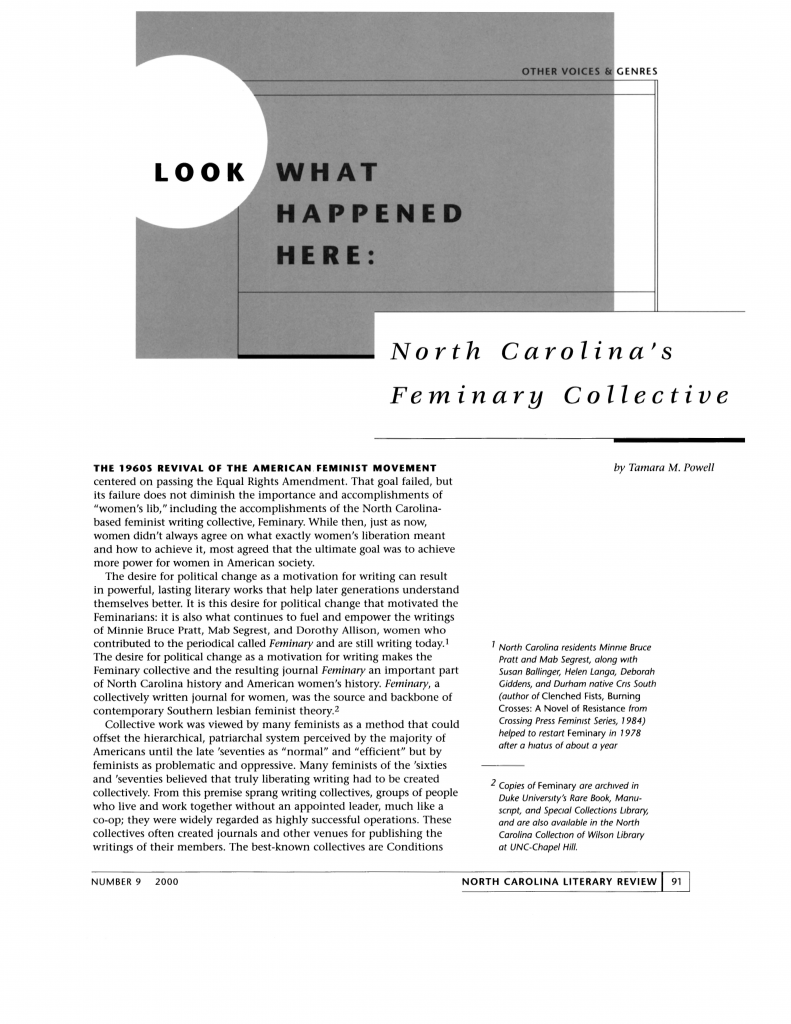Friday from the Archives: “Hearing Me Into Speech: Lesbian Feminist Publishing in North Carolina” by Wynn Cherry and “Look What Happened Here: North Carolina’s Feminary Collective” by Tamara Powell, from NCLR 9 (2000).
We join with friends and family in mourning the passing of poet, writer, activist Minnie Bruce Pratt, who passed away in early July. She leaves behind an incredible body of work, from early poetry to recent essays on social justice and her long relationship to her spouse.
Pratt, along with several other NC writers, was the subject of “Hearing Me Into Speech: Lesbian Feminist Publishing in North Carolina” by Wynn Cherry and “Look What Happened Here: North Carolina’s Feminary Collective” by Tamara Powell, in NCLR 9. Cherry wrote:
“Southern voices were very much part of the chorus of anger that erupted in the 1970s, and angry Southern daughters helped mold ideology, made significant contributions to feminist publishing, and produced works that challenged traditional thinking and that subverted patriarchal control. Some of the most significant contributions to the radical feminist movement came from North Carolina writers, editors, and publishers. Among those committed to making the lesbian voice heard were Bertha Harris, a Fayetteville native; Mab Segrest, a long-time resident of Durham; Minnie Bruce Pratt, who Jived in the Fayetteville area as well as the Triangle; Catherine Nicholson, a native of Troy, North Carolina; and Harriet Desmoines, who lived in the Triangle (Raleigh, Durham, and Chapel Hill) during the Seventies.”
Cherry’s article examines the landscape of the Southern lesbian feminist writing movement coming out of the Civil Rights aftermath. She explained, “Periodicals such as the North Carolina-based Feminary and Sinister Wisdom, noted by the Atlanta Lesbian Feminist Alliance as two of the most significant efforts of Southern feminists, allowed lesbians a safe space in which to define themselves; to reclaim their words and their intellect, which they perceived to have been under the control of men; and to explore issues critical to the growing feminist movement.”
Powell’s piece examines the work of Feminary in particular. That magazine was crafted in Raleigh and Durham from 1978 to 1983 and is now archived at the Duke Rubenstein Library. “The writing collectives were important because they gave women a forum in which to be subjects in their writing,” Powell explained. “In retrospect, Feminary was significant because, as Pratt recalls, “we felt like we had some very important and different things to say because we were in the South.”
We are grateful for the work Pratt accomplished while living in North Carolina and for her ongoing commitment to her own visibility and her work as an social justice activist throughout America and beyond.
Order the 2000 issue to read both articles.
